The following article appeared in the
Ottawa Citizen, the
Montreal Gazette and the
Vancouver Sun. A very special
thank you to both Norman Provencher and the Ottawa Citizen for allowing the
Ottawa Beatle Site to reproduce the story. Technical note to
readers: John and Yoko's testimony was given on December 22, 1969, in a private
meeting aboard a train at the Canadian National Railway station in Montreal with
commissioner's Ian Campbell and Dr. Heinz Lehmann. On December 23, 1969, both
John and Yoko met with Health Minister John Munro for a 1½ hour chat on drugs
and other topics (please read: "Drugs: John pledges help" -- by Tracey Morey, Dec 24, 1969, the Ottawa Citizen).
Lennon On Drugs
Revealed: The Beatle's secret testimony on marijuana in
Canada
by Norman Provencher, Ottawa Citizen, May 17, 2003.
More than three decades later,
Canada is finally living up to the promise John Lennon held out for it in a
secret session with two Le Dain commissioners three days before Christmas, 1969.
"And we honestly think a place like Canada looks like the only hope, because the
only hope or help we've had is from Canada. This is the opportunity for Canada
to lead the world."
- John Lennon to the Le Dain commissioners, Dec. 22, 1969
However, even that long-awaited small step, decriminalization of possession of
less than 15 grams of marijuana, was delayed again this week, apparently after
complaints from the U.S. and Liberal party infighting. Prime Minister
Jean Chretien insists the bill, sponsored by Justice Minister Martin Cauchon,
will go ahead and will probably be presented when Parliament returns from recess
at the end of May.
The bill has appalled U.S. authorities, who quake at the prospect of a flood of
"B.C. Bud," a homegrown strain of marijuana that the U.S. authorities refer to
as the "crack cocaine of marijuana."
But Lennon had even more liberal measures in mind when he testified with his
wife, performance artist Yoko Ono, in a secret session three days before
Christmas, 1969, with Le Dain commissioners Ian L. Campbell and the late Dr.
Heinz Lehmann.
The testimony technically became available under Access to Information
legislation at the turn of the century, 20 years after Lennon's murder.
But the testimony was only recently uncovered by John Whelan, researcher for
the Ottawa Beatles Site Web page. Ono's testimony was excised from the more than
12,000-word documents because she is still alive.
Lennon favoured legalization of cannabis, arguing that marijuana was essentially
a benign product, less damaging than alcohol and a welcome component of his and
his wife's crusade for world peace.
He had no preferences as to how the drugs could be delivered, as long as
distribution was taken away from "pushers in the schoolyards."
"The only way to sell the pot to the machine (the establishment) is to let the
machine have it," he suggests at one point.
"Let (the establishment) have all the factories. Let it make all the bread in
the world. The people only want to smoke. They don't care who makes the money."
And there was money to be made, Lennon says. Even a modest level of taxation
could raise huge funds for everything from research to health care to peace
projects.
But what was surprising about the rambling, joking, poetic and sometimes surreal
interview was Lennon's aversion -- he was considered to be the Fab Four's
hard-core druggie -- toward hard drugs, which he describes as "speed, H, and all
the sleepers and the bombers and the rest of that stuff.
"I think all those hard drugs are bad," he says bluntly.
Even LSD, often at the heart of much of the Beatles' imagery and musical
innovation, receives Lennon's less-than-wholehearted support.
In fact, Lennon confesses he stopped using acid because it "burned my head off."
"I personally would never condemn it from my own experience, but I condemn
the free use of it."
Lennon said he understood LSD might have some value in psychological treatment
and admitted that "I think it could possibly be made available under
supervision," but, overall, he was no fan.
"I think it probably does burn your head off because I stopped using because it
did burn my head off and, of course, there's bad drugs around now...that has God
knows what in it."
But, perhaps most surprisingly, was Lennon's enthusiasm for Canada -- half the
time he broached the topic himself.
He was taken by the country: It had already been the site of one of the most
important events in his peace program, the bed-in at the Queen Elizabeth Hotel
in Montreal that produced the seminal record Give Peace a Chance. |
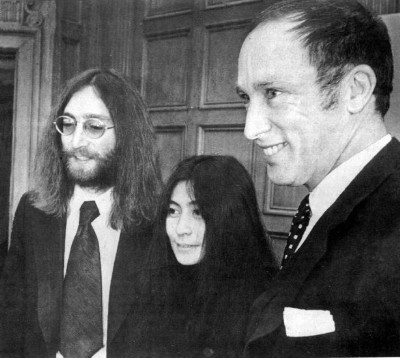
John Lennon, Yoko Ono with Prime
Minister Trudeau. |
He was even taken by the politicians, describing the late Pierre Trudeau and
former health minister John Munro as "hip." He joked that he had to confess they
were members of "the Establishment" who seemed to be worth listening
to.
"Mr. Munro's speech (on decriminalization of marijuana was) the only political
speech I ever heard about that had anything to do with reality that came through
to me."
That sort of "common sense" was found in much of Canadian life and society,
Lennon said.
"We honestly think a place like Canada looks like the only hope," Lennon tells
the commissioners at one point.
"Canada is America without being American, without
that...'We-are-the-mighty-whatever scene.'
"Canada's image is just about getting groovy, you know."
All these years later, nobody quite remembers who invited John Lennon and Yoko
Ono to testify at the
commission.
Munro, contacted at home in Hamilton, was a little vague on the details at
first, but the event gradually came back to him.
"Yeah, I was in a little hot water at the time," said the veteran of several
cabinet posts. "Everybody thought I wanted to give the country to the junkies,"
he laughs.
Munro, who's retired from legal practice but who still consults on a number of
federal legal issues, says he knew Le Dain from their days at Osgoode Hall law
school in Toronto and he always felt that the issue of narcotics needed to be
explored beyond the shock-terror headlines.
He says he was not really familiar with Lennon and the Beatles, although his
daughters were fans, but was impressed when he finally met Lennon earlier in
1969 when he was in Ottawa as a guest of then-student leader Allan Rock.
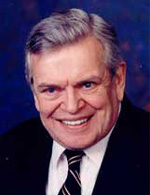
John Munro |
But at a December 23 meeting with Munro, Lennon apparently confirmed that impression.
"The more I think about it, the more I remember he and his wife were very polite
and committed people.
"They asked a lot of questions (about) the work of the commission and of a
speech I had made generally calling for more open policies for some substances."
Munro agrees that, had Lennon's testimony been held in public -- "and I don't
remember why it wasn't" -- it might have had a profound impact on public
perceptions of the drug issues of the day.
"But things were different then, it was exciting and much more open than
today, but, even then, you could only go so far."
|
Former commissioner Marie-Andrée Bertrand wasn't directly involved in the Lennon
interviews, but the respected sociologist who still teaches as professor
emeritus at the Université de Montréal, thinks she knows why the
Lennon session was held in private.
Rightly or wrongly, Bertrand says, the commissioners had come to believe that
the RCMP was scouting the commission's famously open public meetings -- which
including unprecedented open houses at three popular coffee houses:
the Penny Farthing in Toronto, the Bistro in Vancouver and the Back Door in
Montreal -- to check out possible candidates for busts.
The commission went as far as to go to the Mounties in advance to ask them to
stay away.
"It was dreadful," Bertrand said.
"I'm not a lawyer, but I know our terms of reference were different from some of
the other commissions, (and) we weren't able to offer our witnesses protection
from prosecution, particularly in the open meetings.
"We started to hear that young people were being arrested the minute they walked
out of the doors of our meetings. I remember quite clearly the son of Marshall
McLuhan being arrested in Toronto after a meeting (in October,
1969). I don't know how it ended."
Bertrand said the commissioners grew increasingly worried about the safety of
their witnesses, the public's view of their inquiry and, indeed, the legitimacy
of the inquiry itself.
"Some of us went to (solicitor-general Jean-Pierre) Goyer and we said, 'Call off
your gendarmes, monsieur!' and he went to Trudeau, and it was slightly more calm
after that.
"Of course, Monsieur Goyer and Monsieur Trudeau were only in charge of the RCMP.
There was also the provincial police and the municipal forces to consider. And,
in some cases, I'm afraid, the damage had been done." |
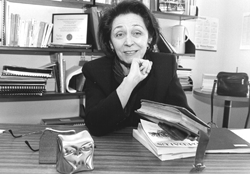
Marie-Andrée Bertrand |
Fortunately, the period is just a faint memory now for Michael McLuhan, son of
Canadian philosopher and media guru Marshall McLuhan. When contacted recently,
the award-winning photographer had mostly forgotten the Le Dain
Commission open house he attended at the Penny Farthing as a 16-year-old in
October 1969.
But he confirmed that, upon leaving the session, he was arrested and charged and
convicted of criminal possession of a miniscule amount of hashish and sentenced
to 60 days in jail. He served 30 days with mandatory release and
he eventually was pardoned in the '70s -- expunging his criminal record.
"Imagine if Monsieur Lennon had been arrested or harassed," Bertrand says. "What
a humiliation that would have been for all of us."
As for the federal government's proposed decriminalization measures, Bertrand is
not impressed.
"Well, it's not so very much, is it?" she says. "I would have thought that,
after all this time, at least for marijuana, the measures would have been much
more liberal."
So did John Lennon, particularly in the area of promoting peace.
"I think, first of all, when you say marijuana leads to H, it's like saying beer
leads to alcoholism. It's no go.
"But marijuana, if it makes you aware, or peaceful, whatever it does to you, and
then you realize how tough reality is, or society, when you are feeling -- it
brings that more gentle, or whatever it is, thing that we all claim about it,
into you."
He told the commissioners he had mostly sworn off drugs, although the pressure
of his popularity sometimes became too much and he was later to backslide a
number of times.
"I prefer not to use any drug," he said. "Now and then I use pot, because I need
it just to relax or whatever it is. So why do we need it? It's the pressure."
Lennon urged the commissioners to be true to the open-minded course they'd
established, and not let the media or other pressure groups divert them.
In fact, he promised to do whatever he could to back the commissioners up,
offering them his and Yoko's "hot line" phone number if they needed support.
"It's a pleasure, anything else we can do to help, don't hesitate, because I
know it's difficult.
"This is our life."
The full text of the Lennon-Ono sessions before the Le Dain Commission can
be viewed at http://www.ncf.ca/beatles/ocrledain.html
|
'It only takes a few of you'
"It's certainly rushed the youth field, marijuana...I must say
this commission that you've set up -- I don't know what's going on in the rest
of the world, you know, in reality, towards drugs -- but this seems to be the
only one that is trying to find out what it's all about with any kind of sanity.
The drug propaganda handed around is the American police
propaganda saying, "Marijuana, the killer sex drug," ...and it's a laugh, you
know, and that's the attitude taken to any propaganda coming down about speed,
H, and all the sleepers and the bombers and the rest of that stuff. Nobody
believes it. I certainly didn't.
Bad trips, the only way to get off a bad trip is to dive in the
water again and learn how to swim again, but some people can't and they are the ones
that are lost until somebody would take them and change them.
The one thing can be said about marijuana is it's
non-violent, and if any government wanted to use
it to calm the people, there wouldn't be any Saturday night crowds and any
Saturday night (soccer) fights.
|
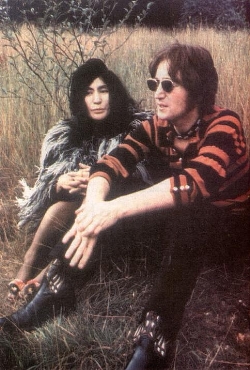
Photo: Peter Fordham |
Marijuana was the main thing that promoted non-violence amongst
the youth, because as soon as they have it, they -- first of all you have to
laugh on your first experiences. There's nothing else you do but laugh, and
then, when you've got over that and you realize that people aren't laughing at
you, but with you, it's a community thing, and nothing would ever stop it.
I was at the Isle of Wight gathering, at a Dylan concert...was the biggest European gathering ever, and
it was a beautiful experience. It was written
up as if it was a holocaust, and that established in the minds of the people
already decided, of the other generation, what's going on. It reaffirmed their
fears of this generation with its haircuts, and its nakedness, and its pot
smoking. The first thing we have got to do is to break through the media and get
them to talk sense.
We are one example, of people who have experienced marijuana (and) we're pacifists.
Are we sitting at home just smoking pot in a den of iniquity? Now, I do more work -- we both do
more work than ever, but it has nothing to do with drugs. The myths about the drugs making you more creative is a myth,
too. There are so many myths about it. It does not make you passive; you (don't)
sit in the mud and wait for bread from Heaven.
When we stick posters 'round saying, "War is over if you want it", what
we're trying to promote is an awareness in people of how much power they do have
and not to rely on government, or leader, or teacher so much that they're all
passive or automatons, and that initial after effect of the drug scene has to be
regenerated.
People (are) beginning to think, "Oh well, it is my responsibility", again. People
were thinking, "Drugs is the answer", but there is no
answer, as we know. The answer is within and you've got to get on with it.
We're trying to get through to those people that they were conned into violence
and that they mustn't expect peace overnight, that we're talking about the next 2,000
or 3,000 years.
We don't believe it's Nixon, or America's fault for the war in Viet Nam. We
think they're scapegoats that people use to blame when things are going wrong
and to praise when things are going well.
We haven't fallen into the trap of blaming it on the Establishment. We
know the Establishment exists of human beings.
Who tells every child that he's not an artist or a poet or a musician? Some
freak when you're aged eleven says, "You get into woodwork and you get into
metalwork. You're no good and you're good". You never get over that, and that's
what is done all the time.
The next thing is you'll all be perverted druggies.
The older generation has to face up to the fact that sooner or later any --
this year, maybe -- that it is a non-violent movement and there is nothing to be
afraid of. If we're no longer afraid of the Establishment, the Establishment has
to stop being afraid of us. It only takes a few of you.
Every businessman in Britain and Europe and the States has got Beatle haircuts
(now) and they've accepted them. They're no
longer frightened of Beatles. The same fear and reaction happened to rock
and roll, to Beatles, to every new fad. It's the same old game and that's all.
We have to talk to China. You can't have the paranoiac person like China in your
midst carrying a gun and just try and block him off. Especially when he's so
big, and it's only our fear that makes him more fearful. He's only a completely paranoid guy that's
had a tough time from his neighbours for a few years. And I think -- if it's the
West that starts talking first...if it's the West that says, "Come on now, come
on," and trips China out or whatever it is, you must extend a hand to a -- to a
mental patient. When we talk to each other, and are straight (things will
change).
There's no shame in manual labour. There's no shame in not being
unintellectual. There's no shame in not being a musician. There's no shame in
not being famous. Raving optimists, aren't we?
People ask us why we are doing this peace kick. What else? We got the fame
and the money and the things that we were supposed to do, and what else is
there?
There's another myth that must be shattered, because there is enough food. I mean, it's a joke. There is enough food.
There's enough food in each city to feed each city in the West. There should be nobody starving in Montreal or
Toronto for any reason on Earth, or in London, and we can certainly feed India. Instead of handing the
Indian Mafia two million pounds and to give them two handfuls of rice and keep it all, and all the rest of the
(inaudible) and the jazz that goes on with all the international charities.
There's nothing else, but to try and save our own skin and our brothers'
skins.
Where are we at if we can't (rouse) the public with the truth?"
-- End of article. Copyright by the Ottawa Citizen, May 17, 2003 and is
used with permission for the Ottawa Beatles Site.
Illustrations from the Ottawa Citizen:
* Photo: The Ottawa Citizen / John Lennon and Yoko Ono met with former prime
minister Pierre Trudeau in a December 23, 1969 trip to Canada. Colour photo,
(John and Yoko) by Peter Fordham,
special to the Ottawa Citizen.
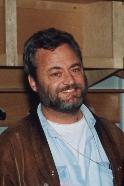
Norman Provencher |
About the journalist, Norman Provencher:
Norman Provencher copped to The Beatles about a week before their Ed Sullivan
appearance. He's been hooked ever since. He began his career in journalism at
The Montreal Star in 1969. He has worked on daily newspapers in eight Canadian
cities, including the Globe & Mail and the Montreal Gazette. Provencher has been
in several blues-based bands over the years and he was a music writer for several years at The Citizen,
where he is now an editor and has freelanced music related articles across North
America.
|
Web Sites of interest:
"Cannabis
- Conclusions and Recommendations"
for the Le Dain Commission of Inquiry
-- by Marie-Andrée
Bertrand
"Forget The Marijuana Scare Stories"
-- by Catherine Mitchell
"Marie-Andrée Bertrand, antiprohibitionniste"
(French text only)
"Cannabis
- Conclusions and Recommendations" for the Le Dain Commission of
Inquiry -- by Ian Campbell
"Cannabis
- Conclusions and Recommendations"
for the Le
Dain Commission of Inquiry -- by Gerald Le Dain, Heinz Lehmann, J.
Peter Stein
"RCMP admits marijuana mainly issue of morality"
--by the Globe and Mail, October 18, 1969
"3,000 students sign pro-marijuana petition"--
by the Globe and Mail, October 18, 1969
"Undercover Operation -- 12 held on
charges of drug trafficking"
-- by the Globe and Mail, October 17, 1969
"Amphetamine alarm -- Rochdalers warn of the 'speed that kills'"
-- by the Globe and Mail, October 18, 1969
"Drug probe is taken on grass-roots tour"
-- by the Globe and Mail, October 18, 1969
"Drugs: John pledges help"
-- by Tracey Morey, Dec 24, 1969, the Ottawa Citizen
John Carr Munro,
former Health Minister for Canada
The Ottawa Citizen





